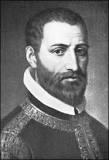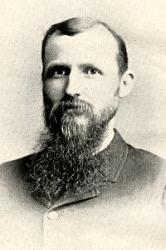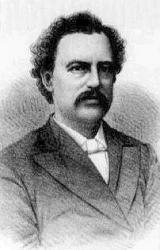Planning worship?
Check out our sister site, ZeteoSearch.org,
for 20+ additional resources related to your search.
- |
User Links
Person Results
W. T. Dale

1845 - 1924 Person Name: W. T. D. Author of "Oh, Save Me at the Cross" in The Harp of Glory
W. T. Dale
V. S. S. Coles
1845 - 1929 Person Name: Vincent S. S. Coles Author of "O Lamb of God, Whose Love Divine" in The Cyber Hymnal Coles, Vincent Stuckey Stratton, son of Rev. James Stratton Coles, born at Shepton Beauchamp, March 27, 1845, and educated at Balliol College, Oxford, graduating B.A. 1868, and M.A. 1872. On taking Holy Orders in 1869, he became Curato of Wantage. In 1872 he was preferred as Rector of Shepton-Beauchamp, Somerset, and in 1884 Librarian of the Pusey Library, Oxford. Mr. Coles has contributed the following hymns to Hymns Ancient & Modern, and the Society for Promoting Christian Knowledge Church Hymns.
1. Lord, in whose eternal counsels. For guidance and growth in holiness. It was first printed as a leaflet, written for E. C. U. Festival, c. 1870; and then included, after revision, in S. P. C. K. Church Hymns, 1871.
2. Most Holy Father, bending low. Lent. No. 45 in the Bucharistic Hymnal, 1877.
3. 0 Lamb of God, whose love divine. Martyrs ( Virgins). Given in the Appendix to Hymns Ancient & Modern, 1868.
4. O Shepherd of the sheep. Martyrs (Bishop). Also given in the Appendix to Hymns Ancient & Modern 1868.
5. We pray Thee, heavenly Father. Preparation for Holy Communion. Originally written for a Communicants' class, it was included in S. P. C. K. Church Hymns, 1871, and in the revised Hymns Ancient & Modern 1875.
6. Lord, I cannot seek Thee. Spiritual Communion. Contributed to Lyra Eucharistica, 1863, and repeated in the Churchman's Altar Manual, 1882.
--John Julian, Dictionary of Hymnology (1907)
=====================
Coles, V. S. S., p. 242, ii. Recently additional hymns by Mr. Coles have come into common use, including:—
1. Almighty Father, Lord most high. [Holy Communion.] Written for Hymns Ancient & Modern and given in the 1904 edition, No. 264, to be sung "At the Offertory." It is admirably suited for the purpose.
2. Father, Whose love we have wrong'd by transgression. This "Litany for Lent," in Hymns Ancient & Modern 1904, No. 633, is a cento from the author's Metrical Litany, published by Novello. The Pt. ii. in Hymns Ancient & Modern begins “Christ with the twelve the last Passover keeping."
3. We pray Thee, heavenly Father, p. 242, ii., 5. This hymn, with the exception of stanza i., is entirely rewritten in The English Hymnal, 1906.
4. Ye who own the faith of Jesus. [B. V. M.] This appeared in The English Hymnal, 1906, for "St. Mary the Virgin.”
--John Julian, Dictionary of Hymnology, New Supplement (1907)
V. S. S. Coles
Edward C. Deas
? - 1944 Author of "Let mortal song awake
in honor of our King" in Gates of Praise for the Worship of God and Use in His Service. Rev. ed. Edward C. Deas (unknown – 1944) was a hymnist, arranger of spirituals, music publisher, and music authority for the AME Church. Deas’s hymns, such as “Big Business in Glory” (1921) and “Shine for Jesus” (1925), reflect the simplicity and usage of common language characteristic of the 19th-century revival hymn. Deas also wrote the book Songs and Spirituals of Negro Composition (1928).
--Encyclopedia of African American Music, Volume 3, edited by Emmett George Price
Edward C. Deas
Jacob Arcadelt

1505 - 1568 Person Name: Jacques Arcadelt, c. 1514-1560 Composer (attributed to) of "ARCADELT" in The Book of Praise Jacob Arcadelt born in the Netherlands towards the end of the 15th century, died in Paris. The story that he was a pupil of Joaquin Deprès is probably untrue. In 1540 he was admitted into the Pontifical Choir at Rome, and in 1555 (?) entered the service of Cardinal Charles of Lorraine, Duke of Guise, whom he followed to Paris. Arcadelt was on of the many Flemish composers who migrated to Italy; he helped to found the "great" Roman school, and was one of Palestrina's most distinguished forerunners. he united French delicacy of sentiment, Flemish mastery of musical form, and Italian culture in quite an exceptional way, and was at once one of the most important and prolific composers of his day. Together with Willaert and Verdelot, he was one of the founders of the madrigal. His first book of 53 madrigals (Venice, 1538) reached it sixteenth edition in 1617, and was followed by five other books. If in his church compositions Arcadelt's style is of almost heroic grandeur, and shows the most complete mastery over all the intricacies of counterpoint (albeit he seems to have despised the then popular "Netherlandish tricks"), in his Italian madrigals we discover perhaps the first dawn of the sentimental element in music. His French chansons, on the other hand, are perfect little cabinet-pieces of contrapuntal elaborateness. Notwithstanding the glorious musical epoch which followed close upon his death. Arcadelt's works were long looked upon with the greatest veneration' Frecobaldi wrote an organ piece on a them "del Signore Arcadelt," and even Liszt wrote a pianofote piece on an Ave Maria of his.
Cyclopedia of Music and Musicians by John Denison Camplin, Jr. and William Foster Apthorp (Charles Scribner’s Sons, 1888)
Jacob Arcadelt
D. E. Dortch

1851 - 1928 Composer of "[O Lamb of God, whose precious blood]" in Hymns of Victory Born: March 5, 1851, Theta, Tennessee.
Died: November 9/11, 1928, Tennessee.
Buried: Rose Hill Cemetery, Columbia, Tennessee.
Dortch was teaching music in Maury, Tennessee, in 1880, and was working as an evangelist by 1886. His works include:
Tidings of Joy (Columbia, Tennessee: 1878)
National Tidings of Joy (Nashville, Tennessee: National Baptist Convention of America, 1878)
Gospel Melodies, with William Dale & Charles Pollock (Nashville, Tennessee: Cumberland Presbyterian Publishing House, 1890)
Spirit and Life, with Edmund Lorenz (Dayton, Ohio: Christian Publishing Association, 1893)
Choice Songs (Nashville, Tennessee: National Baptist Convention of America, 1894)
Gospel Voices (Nashville, Tennessee: South-Western Publishing House, 1895)
Gospel Voices No. 3 (Columbia, Tennessee: David E. Dortch, 1902)
Hymns of Victory, Parts 1 and 2 (Columbia, Tennessee: Dortch Publishing Company, 1905)
Happy Greetings to All (Charlotte, North Carolina: Dortch Publishing Company, 1916)
© Cyber Hymnal™ (www.hymntime.com/tch)
D. E. Dortch
Henry Lahee
1826 - 1912 Person Name: H. Lahee Composer of "[O Lamb of God most lowly]" in The Spirit of Praise Born: April 11, 1826, Chelsea, London, England.
Died: April 29, 1912, London, England.
Lahee studied under John Goss and William Sterndale Bennett. He played the organ at several churches, including Holy Trinity Church, Brompton (1847-74). He won prizes for his compositions in Bristol, Manchester, Glasgow, and London, and set to music poems by Edgar Allen Poe ("The Bells"), Henry Wadsworth Longfellow ("Building of the Ship") and Alfred Tennyson ("Sleeping Beauty"). His works include:
Metrical Psalter, with William Irons, 1855
Famous Singers of Today and Yesterday, 1898
One Hundred Hymn Tunes
Sources:
Frost, p. 680
CS Concordance, pp. 246-47
Nutter, p. 460
--www.hymntime.com/tch
Henry Lahee
John Theodore Mueller
1885 - 1967 Person Name: J. T. Mueller Translator of "O Lamb of God most holy, on Calvary slain and afflicted, in spirit ever lowly"
John Theodore Mueller
W. Warren Bentley

Person Name: W. W. Bentley Composer of "[Close to thee, O lamb of God]" in Gathered Jewels
W. Warren Bentley
Alessie B. Faussett
1841 - 1902 Author of "O Lamb Of God! That Tak'st Away" in The Cyber Hymnal Faussett, Alessie, née Bond, daughter of the Rev. William Bond, Rector of Bailee, county of Down; born at Bailee Rectory, Jan. 8, 1841, and married to the Rev. Henry Faussett, Incumbent of Edenderry, county of Tyrone, 1875.
Her poetical works are (1) Thoughts on Holy Words, 1867, printed for private circulation; (2) The Triumph of Faith, 1870; (3) The Cairns of Iona, and other Poems, 1873.
Her hymns in common use include:—
1. Be with us all for evermore. For Divine Protection. Written in 1867, and first printed for private circulation in her Thoughts on Holy Words, 1867.
2. O Lamb of God, that tak'st away. Lent. Written in 1865, and first published in The Triumph of Faith, 1870.
These hymns were given in the Irish Church Hymnal, 1873. [George Arthur Crawford, M.A]
--John Julian, Dictionary of Hymnology (1907)
Alessie B. Faussett
Melancthon Woolsey Stryker

1851 - 1929 Person Name: M. W. S. Translator of "O Lamb of God unspotted" in College Hymnal Stryker, Melancthon Woolsey, D.D., son of the Rev. Isaac Pierson Stryker, was born at Vernon, New York, Jan. 7, 1851, and educated at Hamilton College (1872) and Auburn Theological Seminary (1876). In 1876 he entered the Presbyterian ministry as Pastor at Auburn, New York. In 1878 he removed to Ithaca, N. Y.; in 1883 to Holyoke, Massachusetts, and in 1885 to Chicago, Illinois. He received his degree of D.D. from Hamilton College in 1889. He has edited Christian Chorals, 1885 ; New Alleluia, 1880-86; and Church Song, 1889. He was also joint editor with H. P. Main of The Church Praise Book, 1882. He has also published Hymns and Verses, 1883, and Song of Miriam, and Other Hymns and Verses,
1888. To two of these works which have been designed for daily use in divine worship Dr. Stryker contributed the following original hymns:—
i. The Church Praise Book, 1882.
1. Burst forth, 0 Bridegroom, from Thy chamber bright. Second Advent Desired. (1880.)
2. Death cannot make my soul afraid. Death Contemplated. (1881.)
3. Eternal day hath dawned. Heaven. (1881.)
4. Mighty God, Thy Church recover. Missions. (1881.)
5. King again, ye starry chime. Christmas. (1881.)
6. Sing, Israel, for the Lord your strength. Passing the Red Sea. (1878.)
7. The tribes of faith from all the earth. Heaven. (1881.)
8. Thy Kingdom come, 0 blessed Son of God. Second Advent Desired, (1880.) Re-written in Church Song, 1889, as "Thy Kingdom come, 0 everlasting Lord."
9. When the everlasting Lord. Morning. (1880.)
ii. Church Song, 1889.
10. Arouse Thy Church, Almighty God. Missions. (1887.)
11. Father, as here we bow. Holy Trinity. (1886.)
12. Four hundred years their course have sped. American National Hymn. (1888.)
13. God of our Fathers, our God to-day. National Hymn. (1889.)
14. Lo, where that spotless Lamb for sin provided. Passiontide. (1884.)
15. My Maker, at Thy holy throne. Holy Baptism. (1888.)
16. O God, Thy judgments give the King, Thy Son. Missions. (1883.)
17. O Thou, Eternal, Changeless, Infinite. Praise to God. (1882.)
18. 0 Thou, Omnipresent. Omnipresence of the Father. (1885.)
19. O Thou Shepherd of Thine Israel, hear us. Ps. lxxz. (1883.)
20. Our God, and our Redeemer. Opening of a Place of Worship. (1883.)
21. Robbed, bruised, and dying, once I lay. The Good Samaritan. (1886.)
22. Sing, every boy and maiden. Praise to God. (1885.)
23. Thou, Lord of my life, by the words Thou hast said. Lent. (1887.)
24. Thy grace is all of grace. Divine Grace. (1886.)
25. To Thee, our God, these babes we bring. Holy Baptism. (1886.)
26. Tranquilly, slowly, solemnly, lowly. Burial. (1884.)
27. We close Thy blessed Word. Sunday Evening. (1S87.)
28. While all the night-stars fade and wane. Easter. (1884.)
In addition to these original hymns Dr. Stryker has several translations from the German which are in common use. One of his hymns, No. 513, "Now I lay me down to sleep" (Child's Evening hymn), in Church Song, 1889 (dated 1884), begins with a stanza by another hand. In the same work there are also several of his tunes. Dr. Stryker's hymns are massive and rugged, full of dogmatism and fire, but they lack unity and purity of rhythm. In some instances words stand for thoughts, and exclamations for ideas. Nevertheless a few will live.
-- John Julian, Dictionary of Hymnology (1907)
=================
Stryker, M. W., pp. 1098, i.; 1525, ii. 7; 1615, iv. In 1892, Dr. Stryker became Presi¬dent of Hamilton College and also received the LL.D. from Lafayette College. His College Hymnal, 1897, 1904, contains 28 of his hymns, the majority of which date 1890-1894. Of these "From doubt and all its sullen pain" (Faith), written in 1890, is found in other collections. Dr. Stryker d. in 1905. His Dies Irae was published 1892, and his Latermath (verse) 1896.
--John Julian, Dictionary of Hymnology, New Supplement (1907)
Melancthon Woolsey Stryker


 My Starred Hymns
My Starred Hymns


